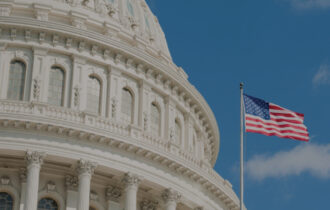Keeping up with compliance developments can be difficult and time-consuming. This quarterly update highlights recent legal developments to help your organization stay on top of new requirements and minimize compliance risks.
For more information on these topics, contact us.
Recent Federal Developments
OBBB ACT INCLUDES SIGNIFICANT TAX AND BENEFIT CHANGES FOR EMPLOYERS
On July 4, 2025, President Donald Trump signed the One Big Beautiful Bill Act (OBBB Act) into law. The OBBB Act includes a wide variety of changes for employers and employee benefit plans, including provisions that:
- Expand the availability of health savings accounts (HSAs);
- Permanently extend the telehealth exception for HSA-compatible high deductible health plans (HDHPs);
- Increase the maximum annual limit for dependent care contribution programs;
- Allow employers to help pay employees’ student loans beyond 2025 and make cost-of-living adjustments to the tax exclusion for educational assistance programs;
- Allow employers to contribute up to $2,500 to a new type of tax-advantaged account for children called a Trump Account;
- Expand the employer federal tax credit for paid family and medical leave (PFML) and makes the credit permanent; and
- Allow certain workers to take an above-the-line deduction for “qualified tips” and “qualified overtime compensation.”
In general, these changes are effective beginning in 2026, although the telehealth exception for HDHPs is retroactively effective for plan years beginning after Dec. 31, 2024. Also, the tax change for qualified tips and overtime pay is effective for taxable years from 2025 through 2028.
SUPREME COURT UPHOLDS ACA’S MANDATE FOR FREE PREVENTIVE CARE
On June 27, 2025, the Supreme Court upheld a key component of the Affordable Care Act’s (ACA) preventive care mandate. The ACA requires non-grandfathered health plans and health insurance issuers to cover a set of recommended preventive services without imposing cost-sharing requirements, such as deductibles, copayments or coinsurance, when the services are provided by in-network providers. The plaintiffs, a small group of individuals and businesses in Texas, had religious objections to the ACA’s preventive care mandate and challenged its legality on various grounds. Due to the Court’s ruling, the ACA’s preventive care mandate remains in full effect, and health plans and issuers are required to continue covering the entire range of recommended preventive care services without cost sharing.
FEDERAL COURT VACATES HIPAA PRIVACY PROTECTIONS FOR REPRODUCTIVE HEALTH CARE
On June 18, 2025, the U.S. District Court for the Northern District of Texas struck down a final rule that was issued in April 2024 to strengthen HIPAA’s privacy protections for reproductive health care. The final rule, which became effective Dec. 23, 2024, prohibited health plans and other regulated entities from using or disclosing protected health information (PHI) related to lawful reproductive health care in certain situations. The Texas decision vacates these new protections in their entirety nationwide. Going forward, regulated entities must still comply with HIPAA’s general privacy requirements for PHI and any applicable state privacy laws. However, the final rule’s heightened privacy protections for reproductive health care no longer apply.
SUPREME COURT UPHOLDS STATE BAN ON GENDER-AFFIRMING CARE FOR MINORS
On June 18, 2025, the Supreme Court upheld the constitutionality of a Tennessee law banning certain medical care, such as puberty blockers and hormone therapy, for transgender minors under the age of 18. The plaintiffs argued that the law violated the equal protection clause of the 14th Amendment. The Supreme Court held that the Tennessee law does not classify individuals based on sex or transgender status and, therefore, did not trigger heightened scrutiny. The Court found the law clearly met a “rational basis” standard of review and did not violate the equal protection guarantee of the 14th Amendment. As a result of the ruling, the law will remain in effect and may influence the outcomes in other cases involving state laws with similar restrictions on gender-affirming care.
SUPREME COURT REJECTS HEIGHTENED STANDARD FOR TITLE VII REVERSE DISCRIMINATION CLAIMS
On June 5, 2025, the Supreme Court held that reverse discrimination claims do not require more evidence than standard discrimination claims. Instead, all discrimination claims are subject to the same evidentiary standard, regardless of whether the plaintiff is a member of a majority or minority group. As background, Title VII of the Civil Rights Act (Title VII) prohibits employers from intentionally discriminating against individuals on the basis of race, color, religion, sex or national origin. The traditional framework for analyzing Title VII discrimination claims generally requires an initial showing that the employer acted with a discriminatory motive based on the individual’s protected trait. However, circuit courts historically disagreed as to whether individuals alleging discrimination based on their membership in a majority group (e.g., status as white, heterosexual or male) must also show “background circumstances to support the suspicion that the defendant is that unusual employer who discriminates against the majority.” The Supreme Court unanimously held that the requirement for additional background circumstances is inconsistent with Title VII’s text and Supreme Court case law.
TRUMP ADMINISTRATION ANNOUNCES NONENFORCEMENT POLICY FOR 2024 FINAL RULE ON MENTAL HEALTH PARITY
On May 15, 2025, the U.S. Departments of Labor (DOL), Health and Human Services, and the Treasury (Departments) released a statement regarding nonenforcement of the 2024 final rule under the Mental Health Parity and Addiction Equity Act (MHPAEA). MHPAEA requires parity between a group health plan’s medical/surgical benefits and mental health/substance use disorder benefits. An employer trade group has filed a lawsuit to invalidate the final rule. According to the Departments’ statement, they will not enforce the 2024 final rule (or otherwise pursue enforcement actions) based on a failure to comply that occurs prior to a final decision in the litigation, plus an additional 18 months. The Departments are also reexamining their MHPAEA enforcement program more broadly. Employer-sponsored health plans should continue to comply with MHPAEA’s statutory requirements, including the comparative analysis requirement for nonquantitative treatment limitations (or NQTLs), and may refer to the 2013 final rule for compliance guidance.
DOL ISSUES GUIDANCE ON INDEPENDENT CONTRACTOR MISCLASSIFICATION
On May 1, 2025, the DOL issued Field Assistance Bulletin (FAB) 2025-1 on how to determine employee or independent contractor status when enforcing the Fair Labor Standards Act (FLSA). In 2024, the DOL published a final rule revising the agency’s guidance on analyzing who is an employee or independent contractor under the FLSA. Several lawsuits are pending in federal courts challenging the 2024 final rule. In those lawsuits, the DOL has taken the position that it is reconsidering the final rule, including whether to rescind it. The FAB provides that, while the DOL reviews the 2024 final rule, it will no longer apply the rule’s analysis when determining employee versus independent contractor status in FLSA investigations. Instead, the WHD will rely on principles outlined in Fact Sheet #13 and the reinstated Opinion Letter FLSA2019-6, which addresses classification in the context of virtual marketplace platforms.
IRS ANNOUNCES HSA/HDHP LIMITS FOR 2026
On May 1, 2025, the IRS released Revenue Procedure 2025-19 to provide the inflation-adjusted limits for HSAs and HDHPs for 2026. For 2026, eligible individuals with self-only HDHP coverage will be able to contribute $4,400 to their HSAs, while eligible individuals with family HDHP coverage will be able to contribute $8,750 to their HSAs. Individuals age 55 and older may make an additional $1,000 “catch-up” contribution to their HSAs. The minimum deductible amount for HDHPs is $1,700 for self-only coverage and $3,400 for family coverage for 2026. The HDHP maximum out-of-pocket expense limit is $8,500 for self-only coverage and $17,000 for family coverage for 2026.
RECENT STATE LAW DEVELOPMENTS
RHODE ISLAND EMPLOYERS MUST PROVIDE NOTICES OF WAGES/EMPLOYMENT PRACTICES TO NEW HIRES
On July 1, 2025, Rhode Island amended its wage payment law to require employers to provide employees with written notice upon hire of information related to wages, rates of pay, allowances, benefits, pay deductions, leave policies and employer-identifying information. The amendment takes effect on Jan. 1, 2026. Employers that fail to comply with the new notice requirement are subject to a $400 fine for the first or second violation. For subsequent violations, employers are subject to the general penalty provisions of the state’s wage payment law.
CALIFORNIA ENACTS AI EMPLOYMENT REGULATIONS
On June 27, 2025, California enacted regulations that ban covered employers from using artificial intelligence (AI) that results in discrimination based on an employee’s protected class. The regulations take effect Oct. 1, 2025. The regulations make it unlawful for employers that regularly employ five or more employees to use an automated-decision system or selection criteria (including a qualification standard, employment test or proxy) that discriminates against an applicant or employee, or class of applicants or employees, on a basis protected by the California Fair Employment and Housing Act (e.g., race, sex, national origin, religion, disability and age), subject to any available defenses.
FLORIDA ENACTS EMPLOYER-FRIENDLY NONCOMPETE LAW
On June 18, 2025, Florida’s legislature passed the Florida Contracts Honoring Opportunity, Investment, Confidentiality, and Economic Growth (CHOICE) Act, allowing employers to enter into enhanced noncompete and garden leave agreements with certain employees. Effective July 1, 2025, the CHOICE Act allows Florida employers to enter into more restrictive noncompetes with employees or independent contractors (excluding health care practitioners) who earn a salary greater than twice the annual mean wage of the Florida county where the employer’s principal office is located (or, if the employer’s principal place of business is not in Florida, where the employee lives).
MINNESOTA AMENDS MEAL AND REST BREAK REQUIREMENTS
On June 14, 2025, Minnesota enacted Senate Bill 17, which expands existing meal and rest break requirements and imposes penalties for noncompliance. The amendments, which become effective on Jan. 1, 2026, require employers to provide employees with a rest break of at least 15 minutes or enough time to utilize the nearest convenient restroom, whichever is longer, for every four consecutive work hours. Employers must also allow employees working six or more consecutive hours an unpaid meal break of at least 30 minutes.
WASHINGTON AMENDS PFML TO LIMIT STACKING AND EXPAND JOB PROTECTION
Washington state has passed amendments to its PFML program. Notable changes reinforce the requirement that PFML run concurrently with leave under the federal Family and Medical Leave Act (FMLA). Other provisions expand job restoration and affect the continuation of health care for employees on leave. For example, the changes allow employers to count FMLA leave against PFML maximum entitlements, but only with notice to employees. The state is also tasked with creating a notice of PFML rights. The amendments take effect Jan. 1, 2026.
COLORADO ENACTS SIGNIFICANT WAGE AND HOUR AMENDMENTS
On May 22, 2025, Colorado enacted House Bill 1001, which makes several important changes to the state’s wage and hour laws. Among other amendments, the changes prohibit payroll deductions beyond an employee’s applicable minimum wage, waive the penalty for an employer’s failure to pay final wages if certain conditions are met, revise attorney fee award requirements for employers, update penalties for employee misclassification, and expand discrimination and retaliation protections. The amendments become effective on Aug. 6, 2025.
WASHINGTON EXPANDS PREGNANCY AND LACTATION ACCOMMODATIONS
On May 20, 2025, Washington amended the Healthy Starts Act, which requires covered employers to provide reasonable accommodations for pregnancy and related conditions. Effective Jan. 1, 2027, all Washington employers with one or more employees will be required to provide pregnancy accommodations under the act. The amended act will also provide greater protections for employees, including paid lactation breaks at the employee’s regular compensation rate and scheduling flexibility for postpartum visits.
IOWA REQUIRES EQUAL TREATMENT FOR EMPLOYEES WHO ADOPT CHILDREN
On May 19, 2025, Iowa Gov. Kim Reynolds signed House File 248, providing rights to employees who adopt children. Effective July 1, 2025, the new law requires employers to treat employees who adopt children up to 6 years of age in the same manner as employees who are biological parents of a newborn child with respect to employment policies, benefits and protections. The requirement for equal treatment applies during the first year of the child’s adoption.
MISSOURI REPEALS PAID SICK LEAVE LAW
In November 2024, Missouri voters approved a ballot measure requiring employers to provide earned paid sick leave to their employees. The law mandated that leave would accrue at the rate of one hour per every 30 hours worked, starting May 1, 2025. Employers could cap employee use of earned paid sick leave at 40 or 56 hours per year, depending on the employer’s size. On May 14, 2025, the Missouri General Assembly voted to repeal the state’s earned paid sick leave law. Missouri Gov. Mike Kehoe signed the repeal of the state’s earned paid sick leave law, effective Aug. 28, 2025. This means employers will not have to comply with the earned paid sick leave law as of that date.
OREGON LEAVE LAW AMENDMENTS TAKE EFFECT IN SEPTEMBER
On May 14, 2025, Oregon enacted Senate Bill 69, amending its family leave, PFML and paid sick leave laws, with the revisions going into effect Sept. 26, 2025. Key changes address leave to care for children, return-to-work certifications and qualified reasons for PFML. For example, the amendments limit child care leave to caring for minor or impaired children, allow employers to require workers on PFML to obtain a medical certification before returning to work, and add to the permitted reasons for taking paid sick leave.
WASHINGTON ENACTS MINI-WARN LAW
On May 13, 2025, Washington enacted the Securing Timely Notification and Benefits for Laid-Off Employees Act, which requires covered employers to give 60 days’ advance notice prior to a mass layoff or business closing. The act, which is effective on July 27, 2025, applies to employers with 50 or more full-time employees. A “mass layoff” includes a reduction in force not due to a business closing that results in an employment loss of 50 or more full-time employees in a 30-day period. A “business closing” includes a permanent or temporary shutdown of a single employment site or one or more facilities or operating units that will result in an employment loss for 50 or more full-time employees.
NEW YORK BUDGET INCLUDES SIGNIFICANT CHILD LABOR REFORMS
On May 9, 2025, New York Gov. Kathy Hochul signed several provisions into law under the 2025-26 New York state budget, including significant child labor reforms. Among the child labor reforms are increased civil penalties for violations, which became effective immediately, as well as changes to requirements for minor employment certification and recordkeeping and certain child labor protections, which take effect on May 9, 2027.












